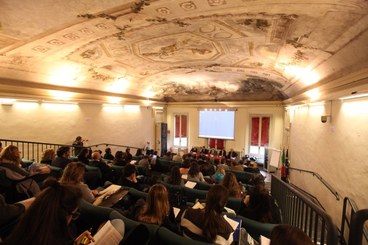The primacy of politics: globalization, debts and power in Western Asia and North Africa, 1979-1992
Massimiliano Trentin (University of Bologna) presents his ongoing research on the politics of debt crises and debt negotiations in Western Asia and North Africa.

-
Date: 10 JUNE 2025 from 13:00 to 14:00
-
Event location: Aula Romei, Palazzo Hercolani, Strada Maggiore 45, Bologna
-
Type: CONNECT seminars
In this talk, Prof. Massimiliano Trentin (University of Bologna) presents his ongoing research on the politics of debt crises and debt negotiations in Western Asia (i.e. the Middle East) and North Africa. The discussant will be Prof. Manuela Moschella.
Talk Abstract
For long, scientific and public debate about economic globalization and neoliberism have taken for granted the connection between the so called external “debt crisis” of the 1980s and the economic restructuring undertaken by indebted, mostly developing, countries. Both promoters and detractors assumed that creditors had the upper hand to set and enforce the terms of repayment, which, in the context of the 1980s, meant Western states compelling indebted ones to align to the development standards of neoliberalism, (ex. cutting domestic demand to curb inflation, liberalize markets and privatize state assets) in order to benefit from the new financial and economic order in the making. Yet, both the power of the creditor as well as the linearity of such a process have recently come under scrutiny by historical research that, on the basis of archival evidence from both creditor and debtor institutions, has shown the contested, negotiated and ultimately differentiated features of such process: first, the standards set for debt restructuring along neoliberalism since late 1970s were not that commonplace among creditors; second, the creditors’ leverage depended on the political relevance of the indebted partners attached by those same creditors; third, debtors states could play full hands their political assets in negotiations as long as they decided for. Such elements do help understand the differentiated timing and patterns of engagement by either single states or specific world-regions into late-XX century globalization, as well as the relevance of political negotiations in international economics.
On the background of almost a decade-long historiographical and archival research, the aim of the lecture is to present: first, the main results of the case-study of Western Asia (namely, Middle East) and North Africa (WANA); second, the connections with other areas, namely Latin America, Central-Eastern Europe, East Asia; third, the connection between the dynamics specific to the WANA “world-region”, as for political and economic cooperation, and those at play at the international level. All these three elements are part of the publication-project of a monograph entitled “The primacy of politics: globalization, debts and power in Western Asia and North Africa, 1979-1992” (il Mulino). In times of debates about the contentiousness or disruption of globalization and liberal order and the resurgence of power politics, the external “debt crisis” of the 1980s in the WANA region might help provide a precedent on the dynamics at play in the unmaking and making of an international order.
Speaker's Short Bio
Massimiliano Trentin works on the International History of Western Asia and North Africa with a special focus on the interplay between diplomacy, economics and development. His monographs, Engineers of Modern Development: East German Experts in Ba’thist Syria, 1965-1972, La Guerra fredda tedesca in Siria. Diplomazia, politica ed economia, 1963-1970 (Cleup 2010 and 2015) and edited volumes like The Middle East and the Cold War (CSP, 2012), Linee di conflitto. Il mondo arabo in trasformazione (Afriche e Orienti, 2013). He published articles on academic journals (Diplomatic History, Cold War History, Foro Internacional, Phoenix, Afriche e Orienti, Middle Eastern Studies, Contemporary European History) and several volume essays (IB Tauris, Lynne Rienner, Peter Lang, Cahiers Irice, Bruno Mondadori, Marsilio, Franco Angeli, il Mulino). More recently, his research has focused on the international history of the “debt crisis” of the 1980s in the region as Principal Investigator of the state-funded research project "The Making of the Washington Consensus. Negotiating international assets, debts and power (1979-91)" (Prin, 2015). Currently, he’s the Coordinator of the LM/MA Programme in International Relations, University of Bologna.